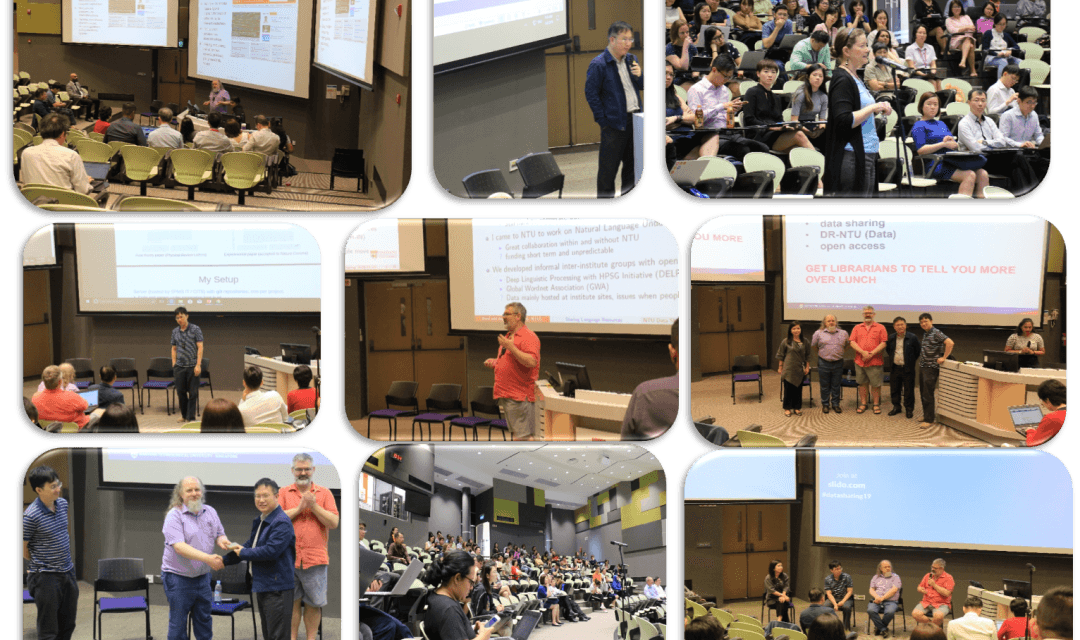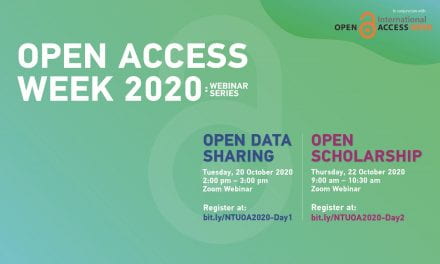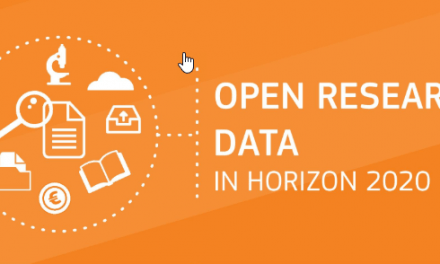Why share research data?
How to share research data?
These are likely to be the key questions which motivated a curious audience of more than 130 people, made up of NTU faculty, research staff, PhD students, administrative staff, and colleagues from other research institutions in Singapore, to come to the Tan Chin Tuan Lecture Theatre in Nanyang Technological University on 6 March 2019 morning.
The data sharing seminar started with a welcome address by Mr. Chia Yew Boon, Deputy Director (NTU Library, Office of Information, Knowledge & Library Services). The first speaker, Mr. Kevin Ashley, Director of Digital Curation Centre presented about the importance of FAIR principles and best practices of data sharing. This gave valuable insight into how researchers can prepare and share their data. Assoc. Prof. Chong Yidong presented his own data sharing experience in NTU research data repository DR-NTU (Data). He found the data deposit and publishing experience a user-friendly one. He discussed about the need to cater to different licensing needs for published research data. The other two speakers echoed similar comments during the panel discussion. Assoc. Prof. Francis Bond, shared his belief that research should be open in principle. He makes his computational linguistics research outputs open access and reusable by other researchers. According to him, “Restricting access to information about human language, the great achievement of our species, is immoral”.
Ms. Goh Su Nee from NTU Library moderated the panel discussion and Q&A session. The top voted question asked for the panelists’ view about the perceived heavy investment of time and effort for research data management and data sharing. The panelists recommended that research workflows should be designed to incorporate the appropriate research data management elements to facilitate timely reminders and checks to researchers to prepare their research data for data sharing in accordance to best practices. The second top voted question was about the Library support for data curation on the NTU research data repository DR-NTU (Data). Prof. Chong Yidong shared about his experience with receiving fine-tuning suggestions for his datasets in the repository from the Research Data Management (RDM) Team in the Library. Su Nee welcomed all who would like to share their research data on DR-NTU (Data) to contact the RDM Team. The panel discussion wrapped up with strong words of encouragement from the panelists to researchers to start preparing their research data early for data sharing so as to reap the benefits from doing so.
Presentation slides:
- Data sharing: a global movement by Mr. Kevin Ashley (Digital Curation Centre)
- Sharing of physics datasets by Assoc. Prof. Chong Yidong (School of Physical and Mathematical Sciences)
- Sharing of language resources by Assoc. Prof. Francis Bond (School of Humanities)
Datasets:
- Researchers perceived data management (and archival) as tedious, time consuming, and additional works on top of their research activities. What is your view on this?
- Could you elaborate further on how the library can help researchers in terms of managing and uploading research data to DR- NTU?
- As open datasets are not peer-reviewed, any advice on how to assess the data quality before we reuse the data?
- How do you encourage (or ensure) academic researchers deposit their data into repositories so that it's FAIR?
- Some qualitative data require a strong understanding of the context from where the data are generated in order for the researchers to interpret them validly. In such cases, researchers may worry that other researchers may interpret the data in ways that are not valid. Any advice on this?
- Sharing negative results from a study is critical. This is easier in some fields than others (e.g clinical trial outcomes). Other than preprints, what are other ways to publish negative results? What are publishers doing (if anything) to enable publication and dissemination of negative results?
- Sometimes research data may underpin commercialization opportunities. In these cases, any advice on how to make the data "open" or "FAIR"?
- What are the Singaporean-centric views / governance on the global data sharing of: a. The research data of non-pathological, health populations b. The research data of pathological or patient data.
- A university has many different discrete research groups and different disciplines. How can everyone follow a standard institutional policy for data storage?
- What are some of the different conventions for data sharing in different academic disciplines or based on different research approaches (e.g. experimental v. phenomenological)
- Some Researchers say there is a secret sauce and are not comfortable with opening their data. How to address their concerns?
- When will the best time to share the research data? Can dataset be shared before the manuscript is accepted?
- Could you illustrate the “interoperable” aspect of FAIR with a few examples- where it worked well, and where it hasn’t worked as well.
- Any stories of reusing data that leads to tangible benefits? (Time savings, etc)
- How to deal with openness and confidentiality (privacy), speed and security?
- Can Amazon, Google or Digital Ocean be used as cloud data storage facilities for: a. The research data of non-pathological, health populations. b.The research data of pathological or patient data.







